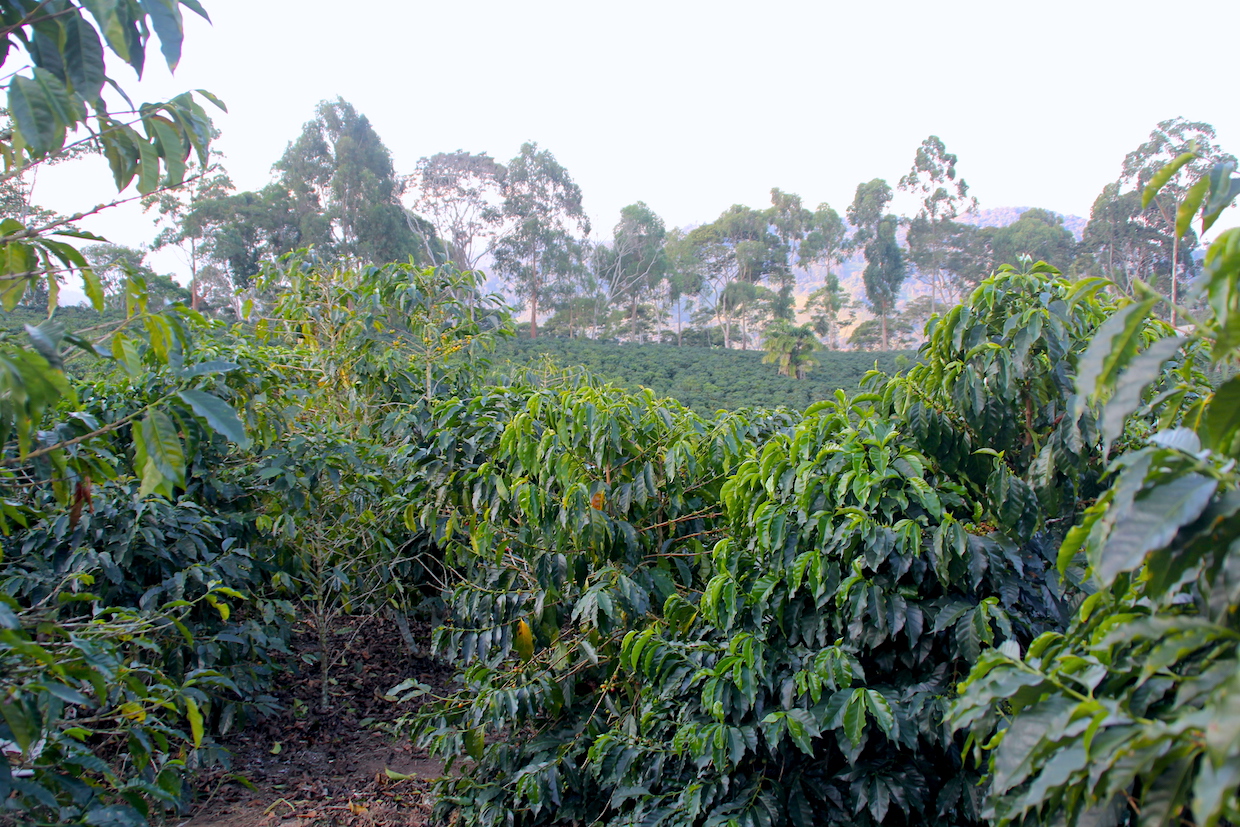[Editor’s note: This is Part 4 of an ongoing editorial series led by Verité exploring labor issues affecting the global coffee sector through its U.S. Department of Labor-funded Cooperation On Fair, Free, Equitable Employment (COFFEE Project). See more of Verité’s work on coffee here. Daily Coffee News does not engage in sponsored content of any kind and all views or opinions expressed in this piece are those of the author/s.]
Farmworkers employed on coffee farms across Latin America are generally paid piece rates, based on the amount of coffee harvested and/or for meeting specific production targets, such as the area of land weeded or the number of coffee plants fertilized.
Piece-rate pay and production quotas or targets are common practices in the coffee sector. However, when there is a lack of adequate controls, these practices can contribute to an increase in numerous labor risks.
Through a combination of field research in Brazil, Colombia, Guatemala and Mexico, and a grievance mechanism in Guatemala, Verité collected information on payment practices from over 2,000 farmworkers employed on coffee farms. Information collected from worker interviews was triangulated with desk research and expert consultations in these and other Latin American countries.
This regional analysis suggested that piece-rate pay and production quotas can contribute to labor risks throughout the Latin American coffee sector, including wage and hour violations, discrimination against women and child labor.
Labor Risks Linked to Piece-Rate Pay and Production Quotas
Piece-rate pay is associated with an elevated risk of wage violations. In many cases, workers paid according to their production are not guaranteed the minimum wage, independent of how much they produce.
Piece rates are often so low that workers may not be able to harvest enough coffee during an eight-hour workday to earn the minimum wage, let alone a living wage. Although a few very productive workers may earn more under a piece-rate pay system — if the piece rate is not too low — many workers risk being underpaid. This is especially true for inexperienced workers or for workers who are unable to carry heavy loads or engage in physically demanding work for prolonged periods of time, such as elderly, underage, pregnant or disabled workers.
Additionally, piece-rate pay creates many channels for wage manipulation, from deception in weighing or measuring the amount of coffee harvested to inaccurate record keeping.
Workers who are paid according to their production are incentivized to work as many hours as possible to harvest as much coffee as possible to maximize their earnings. If the correct controls are not in place, this could lead to overtime payment violations, as workers are generally paid standard piece rates, rather than the overtime premiums to which they are legally entitled.
The risk of forced overtime is elevated when workers must meet production quotas, especially when there are penalties associated with a failure to meet production targets, or when workers must work excessive hours in order to earn enough to survive.
Piece-rate pay is also associated with gender disparities. All too often coffee farms directly pay only the male heads of household and consider the family members who work alongside them as “helpers.” Thus, in many cases, men are paid for their female partners’ work. This makes women “invisible,” highly vulnerable and economically dependent upon their male partners, as they are deprived of discretionary income and independence.
Such disparities can negatively affect the wellbeing of families, as women have been shown to more frequently spend household income in ways that benefit their children, such as on food, education and healthcare. Additionally, women who lack access to their own income may find it more difficult to flee from situations of domestic violence.
Piece-rate pay is also associated with an increased risk of child labor, as parents may have to turn to their children to increase their production. This is especially true when migrant families live in communal housing and lack access to childcare or schools. In such cases, parents often make the rational decision to bring their children to the fields with them, rather than to leave them unsupervised in communal housing, where they are vulnerable to sexual abuse and are often not provided with adequate food.
The risk of child labor is especially elevated when quotas are instituted, since parents may risk penalties for not meeting their quotas if they do not enlist their children’s help. Children working in coffee production may be engaged in the worst forms of child labor, such as carrying out dangerous tasks — e.g., using machetes or carrying heavy loads — or working longer than legally permitted or during school hours in order to help their families earn enough to survive.
Strengthening Farm Labor Due Diligence Systems
To reduce these risks, coffee buyers need to work closely with suppliers and farming communities to develop and communicate robust policies, conduct ongoing monitoring, respond to violations and develop feasible alternatives to piece-rate pay and production quotas. Companies need to ensure that workers participating in extended supply chains receive the minimum wage, independent of production, and that quotas are eliminated.
Companies can support suppliers and farmers to meet legal requirements by developing human rights due diligence systems in rural communities that monitor, prevent and mitigate labor abuses. Companies and farming communities can undertake measures to improve workers’ understanding of their terms of employment and how their compensation is calculated. Practical steps include:
- Workers should receive written copies of employment contracts detailing their conditions of work in their native languages;
- workers should be provided detailed verbal descriptions of the contents of their contracts in languages they can understand; and
- workers should receive pay slips that itemize earnings and deductions and, when necessary, verbal explanations in a language they can understand.
Additionally, companies and farming communities need to take measures to ensure that women are fairly compensated for their work, that access to childcare and education are available to reduce child labor risks and that confidential grievance mechanisms are in place to allow workers to report labor issues.
It is important to note that farmers need the support of coffee retailers, roasters, and traders to implement the necessary steps to improve payment practices and reduce the risk of negative impacts on workers’ incomes and rights.
Identifying Alternative and Complementary Compensation Approaches
Alternative compensation approaches can be piloted to identify approaches that are mutually beneficial for both farmers and workers in a specific region. For example, in Antioquia, Colombia, Verité is piloting alternative payment and compensation approaches that mutually benefit workers and farmers through the Cooperation On Fair, Free, Equitable Employment (COFFEE) Project, in partnership with the ethical coffee exporter RGC Coffee and the Salgar Coffee Growers Cooperative (Cooperativa de Caficultores de Salgar).
The COFFEE Project is piloting approaches to increase workers’ production and income without increasing their level of exertion, working hours or health and safety risks by using lonas (plastic sheeting) and kanguaros (special gloves). The approach is also designed to avoid increasing costs for farmers, who can instead benefit from the increased productivity.
The project is also evaluating the effectiveness of complementary schemes to increase workers’ incomes and wellbeing, such as supporting entrepreneurship and the formation of micro-enterprises, and increasing access to food assistance, medical care, dental care and retirement benefits through RGC’s Los Manos del Café Project. At the end of the project, Verité will be publishing a document on good practices identified and lessons learned.
Read more from this Labor in Coffee Series here.
Quinn Kepes and Miguel Zamora
Quinn Kepes is a Senior Director at Verité, where he has worked for over 15 years providing businesses, investors, governments, intergovernmental organizations, workers, and civil society the knowledge and tools that they need to eliminate the most serious labor and human rights abuses from global supply chains. He leads Verité’s practice groups on Worker Agency, Voice and Empowerment (WAVE) and Applied Research for Evidence and Action (AREA). Mr. Kepes has been working on labor
issues in the coffee sector for over 15 years and has conducted and directed field research on labor issues on coffee farms in Mexico, Guatemala, Honduras, Colombia, Brazil, and Uganda.
Miguel Zamora has been involved in agriculture for over 25 years. He has worked in farming, research, extension, business development, and economic development initiatives. From Rural Voices CIC, he supports farmers, workers and companies building more sustainable and resilient supply chains. Miguel supports Verité’s initiatives to create and promote adoption of robust resources to identify, mitigate and prevent labor abuses in agriculture.








Comment